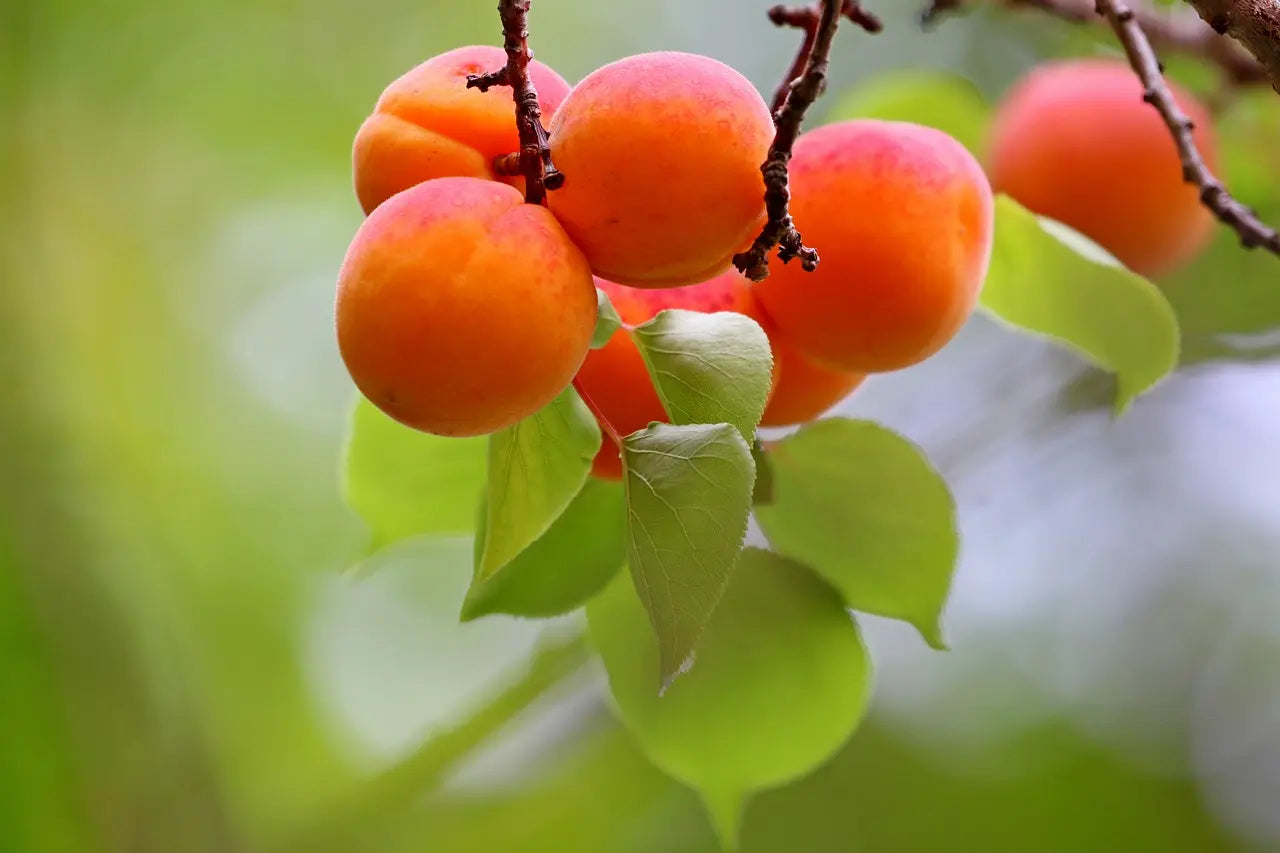-
Delivery from 10 plants to France, Switzerland and Europe
Delivery method -
Fruit Tree Wholesale Supplier
About Us -
Quality Fruit Tree Plants
Technical itinerary
Titus-cov Apricot Tree grafted on Mirab.29-C 1L pot
Titus-cov Apricot Tree grafted on Mirab.29-C 1L pot
The prices shown are our base prices for large volumes. Depending on the quantity ordered and the producers’ pricing scales, the rate may be adjusted upward. Each quote is personalized to ensure you receive a fair price.
Mini order 50 units / Multiple orders 10 units (FRSHER202503001)
Couldn't load pickup availability
 Buy now and get it delivered when you're ready to plant - Add your desired date to your quote request
Buy now and get it delivered when you're ready to plant - Add your desired date to your quote request
- Delivery from 10 plants to France, Switzerland and Europe

Technical sheet of the Apricot variety Titus-cov
- Fruit flesh color: firm and tasty fruit
- Skin color: Orange with a deep red blush
- Size and shape: AA-AAA size, round shape
- Tree size: Vigorous, semi-open habit, reaching 4 to 6 meters at maturity
- Fruit maturity: Late July to early August, about 20 days after Flopria-cov
- Fruit taste: Good firmness, resistant to cracking, very suitable for fresh marketing
- Earliness of the variety: Late
- Fruiting period: Last decade of July to early August
- Disease resistance and storage: Disease resistance (Sharka, brown rot, bacterial wilt) not documented; excellent post-harvest storage due to fruit firmness and resistance to cracking
- Variety yield: Very productive, requiring thinning to maintain fruit quality
- Is this variety self-fertile? Yes, self-fertile (cross-pollination possible to optimize production)
- Commercial use: Fresh marketing and export thanks to its size and size
- Is this a VOC variety? Yes, protected by a Plant Variety Certificate
- Comments: Intermediate and abundant flowering, reducing the risk of late frost but can affect small fruits in cold weather. Requires rigorous pruning and careful management of the load for good vegetative balance. Choice of determinant rootstock (Montclar, Rootpac R, Mirared) to optimize adaptation to soils and environmental stresses.
Quick read / the essentials on the apricot tree Titus-cov
The Titus-cov apricot tree is a late, self-fertile variety , ideal for producers looking to extend the harvest season and access a less saturated market in late summer . Its AA-AAA size fruit, with orange skin and an intense red blush , is attractive for its firmness and resistance to cracking , guaranteeing excellent post-harvest stability.
Selected under the Plant Variety Certificate (PVC) status, its multiplication and marketing are regulated . Thanks to its intermediate and abundant flowering , it reduces the risks associated with late frosts , although the small fruits may present a certain sensitivity to cold .
For successful cultivation, it is essential to choose a specialist wholesale supplier of apricot plants . Its vigorous, semi-open tree , reaching 4 to 6 meters at maturity , requires rigorous pruning and careful thinning to ensure a balance between vegetative development and regular production .
If you want to buy Titus-cov apricot plants , the choice of rootstock is crucial. Among the recommended options, Montclar, Rootpac R and Mirared offer good vigor and adaptation to local conditions . As a specialist wholesale supplier of apricot plants , we support you in the selection of certified plants adapted to your farm .
With a late maturity (end of July - beginning of August) , the Titus-cov apricot tree represents a strategic opportunity for producers wishing to extend their production and diversify their commercial offer . However, its behavior in the face of diseases and environmental stresses remains to be confirmed , requiring rigorous phytosanitary monitoring . Buying Titus-cov apricot plants from an expert supplier guarantees optimized establishment and efficient production .
Presentation of the Titus-cov apricot tree for apple and apricot growers in France
The Titus-cov apricot tree is a late variety, probably protected by a Plant Variety Certificate (PVC) , although the identity of its breeder is not confirmed in the available sources. It is distinguished by strong vigor, a semi-open habit, abundant flowering and high productivity . Its fruits, of AA-AAA size , have an orange background color with a marked red overprint , good firmness and excellent resistance to cracking .
Origin and varietal status
The geographical origin of Titus-cov has not been specified in the available data. The suffix "-cov" indicates that it is a protected variety, the propagation and commercialization of which require the authorization of the breeder and the payment of royalties.
Tree characteristics
The tree is vigorous , with a semi-open habit , which may require careful pruning management to control its development. It reaches a mature height of 4 to 6 meters and benefits from rapid fruiting .
Flowering is abundant and intermediate in season , partly reducing the risk of exposure to late frosts. However, some sensitivity to frost of small fruits has been reported, which may have an impact on the final yield in the most exposed regions.
Self-fertility and pollination
Titus-cov is a self-fertile variety , which makes orchard management easier by allowing production without the need for external pollinators. However, as with many apricot trees, cross-pollination with other varieties that flower simultaneously can improve yield and fruit quality.
Fruit characteristics
The fruits are round, AA-AAA in size , with good firmness and excellent resistance to cracking , a significant advantage for marketing. Their skin has an orange background color with an intense red overprint , which gives them good visual appeal on the fresh market.
The maturity period is late , about 20 days after Flopria-cov , i.e. towards the end of July - beginning of August . This characteristic allows the harvest season to be extended and access to a market less saturated with early apricots.
Resistance to diseases and parasites
Available data do not specify the resistance of Titus-cov to the main apricot diseases such as brown rot, bacterial wilt or sharka . Phytosanitary monitoring and appropriate preventive measures will therefore be necessary to ensure the sustainability of production.
Regarding pests, no specific information has been found on its susceptibility to aphids, fruit flies or other common pests . As with any apricot crop, regular monitoring and careful protection will be essential to maintain good health.
Resistance to environmental conditions
Information on drought resistance, lime tolerance and root asphyxiation is limited. However, like most apricot trees, Titus-cov will need to be planted in well-drained soil , as it is naturally sensitive to excess moisture .
The choice of rootstock will be decisive in improving its adaptation to soil and climate constraints.
Rootstocks compatible and adapted to cultivation in France
Several rootstocks are potentially suitable for Titus-cov depending on soil type and local conditions:
- Montclar® : medium vigor, used as a reference for apricot trees in France.
- Rootpac® R : slightly more vigorous than Montclar®, well suited to demanding soils.
- Mirared : medium vigor, suitable for various soil types.
- ZH4 : good agronomic potential, sometimes superior to Montclar® in terms of vigor and adaptation to water stress.
- Canino : rootstock tolerant, but sensitive to excess humidity.
- Myrobalan : Widely used for its versatility, but may require cultural adjustments.
- Rubira® : useful for limiting sensitivity to certain diseases.
The choice of rootstock must be adapted to the type of soil and the method of managing the orchard , with a preference for well-drained soils.
Orchard management and cultural advice
Titus-cov being vigorous , it requires careful monitoring of pruning and fruit load to avoid an imbalance between production and vegetative development. Its semi-open shape facilitates the penetration of light and aeration of the tree, which can limit the development of fungal diseases.
Its abundant flowering requires rigorous thinning to optimize the distribution of resources and guarantee good fruit size.
The late maturity period is an advantage for extending the production season, but it requires appropriate logistical planning , particularly in terms of labor for harvesting.
Conclusion
The Titus-cov apricot tree is a late, self-fertile and productive variety, with attractive, firm, crack-resistant fruits . Its vigorous growth and abundant flowering offer good yield potential, although its sensitivity to frost on small fruits should be taken into account in risk areas.
The lack of precise data on its resistance to diseases and environmental stresses requires an evaluation under local conditions before large-scale adoption.
It is advisable to contact the breeder or experimental stations to obtain additional information on its agronomic performance, its sensitivity to diseases and the best cultivation strategies adapted to its establishment in France.
To summarize: the Titus-cov apricot tree
The Titus-cov apricot tree is a late, productive and crack-resistant variety , perfectly suited to producers wishing to diversify their offer at the end of the season . Its large fruit (AA-AAA), with red and orange skin , offers ideal firmness for marketing and export . Its self-fertility guarantees regular fruit set , although cross-pollination with other varieties can optimize yield .
Before buying Titus-cov apricot plants , it is essential to choose a specialist wholesale supplier of apricot plants , guaranteeing certified plants that comply with COV requirements . The choice of rootstock plays a key role in ensuring good adaptation to local conditions . Among the best options are Montclar, Rootpac R and Mirared , allowing for optimal vigor and tolerance to abiotic stresses .
Producers must also anticipate certain challenges:
- Thinning is essential to avoid overloading the tree and ensure optimal commercial size.
- Careful pruning management is necessary to control vigor and maximize production.
- Phytosanitary monitoring is recommended , because its resistance to common diseases (moniliosis, bacteriosis, Sharka) is not yet well documented .
As a specialist wholesale supplier of apricot plants , we offer personalized support and quality plants to buy Titus-cov apricot plants with complete peace of mind. Thanks to its late maturity and high productivity , this variety represents a profitable opportunity for producers looking to extend the season and capture a less competitive market .
-
Titus-cov Apricot Tree grafted on PR-R/Mirared bare-root 100-120 cm
Regular price €7,00 EURRegular priceUnit price / per -
Titus-cov Apricot Tree grafted on Mirab.29-C bare-root 100-120 cm
Regular price €6,60 EURRegular priceUnit price / per -
Titus-cov Apricot Tree grafted on PR-R/Mirared 1L pot
Regular price €7,00 EURRegular priceUnit price / per -
Titus-cov Apricot Tree grafted on Mirab.29-C 1L pot
Regular price €6,60 EURRegular priceUnit price / per



